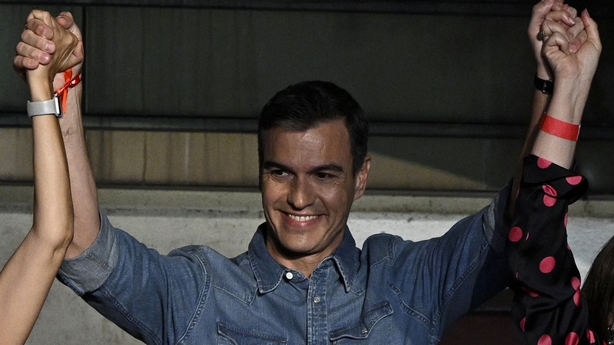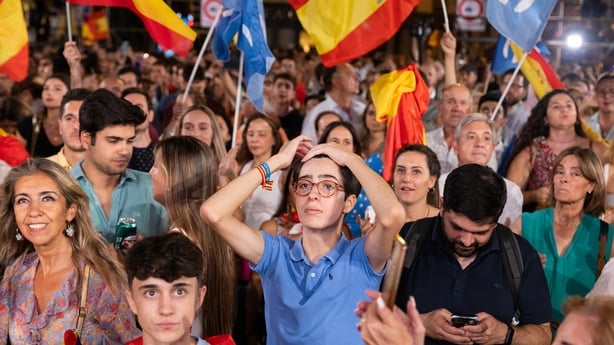Regional pro-independence parties could hold the key to unlocking Spain's political gridlock after a national election ended in a hung parliament.
Going into the election, centre-right People's Party (PP) had looked set to forge a winning alliance with the far-right Vox, an outcome that would have brought hardline nationalists into government for the first time since the end of the Franco dictatorship and Spain's return to democracy in the 1970s.
However, a poorer than expected performance by Vox gave the two parties a combined total of 169, short of the 176 seats needed for a majority.
While those on the other end of the political spectrum did better than expected, they are even further away from a majority.
The ruling Socialists (PSOE), led by Prime Minister Pedro Sanchez, and far-left Sumar won 153 seats between them.
This is unlikely to be resolved quickly. So let's consider three possible scenarios for the road ahead, from the least to the most likely.

Right-wing government
As the largest party, the PP is getting the first run at trying to cobble together enough votes in parliament to form an administration.
Its leader Alberto Nunez Feijoo has urged the socialists and other parties not to "block" his efforts, vowing to give Spain the stability that it needs.
The hung parliament means that the larger regional parties in the Basque region and Catalonia are now potential kingmakers for any new government.
But the PP's alliance with Vox, which has a tough stance on separatism, will make it difficult to gain their support.
Mr Feijoo could seek to form a minority government, but would need Prime Minister Pedro Sanchez's party to abstain during any investiture vote in parliament, something which the socialists have already ruled out.

Sanchez stays on
Mr Sanchez probably has a better chance of negotiating support from those Basque and Catalan separatist parties, as he did following 2019's election.
However, he is unlikely to get the backing of the more hardline Catalan Junts party with its seven seats, as it has recently repeated its unwillingness to work with him, just as he has ruled out allowing a Catalan independence referendum, a key objective for Junts.
If Junts is prepared to abstain, then the socialists have a narrow path to power.
Mr Sanchez needs the 11 seats won by the pro-indepedence Basque parties, the PNV and Bildu, along with the seven seats from the left-wing separatist party, Esquerra Republicana de Catalunya (ERC), and a guaranteed an abstention from Junts.
This would allow him to keep a hold of the reins of power.
A PSOE source said the party was confident of reaching an agreement but that negotiations would take time.
"We are sure about that, and that there will be no repetition (of the election)," the source said.
The Catalans are likely to play hardball in any negotiations as rapprochement with Madrid has not worked in their favour up to this point, said Joan Esculies, a writer and analyst on Catalan politics.
"The independence movement continues to lose votes," he noted. "The only thing that keeps them in the headlines right now is the fact that the combination of seats" makes them a potential kingmaker.

Fresh elections
Analysts believe that this is the most likely scenario.
If neither the left nor the right manage to cobble together a working majority, Spain will have to hold another election, most likely at the end of the year.
There is no deadline for parties to finish negotiating, but if no candidate secures a majority within two months of the first investiture vote in parliament, new elections must be held.
Federico Santi, analyst at political risk consultancy Eurasia Group, said that the PSOE and the PP "may not be opposed to a repeat election, which could see a larger share of the vote converge on the two parties" with smaller parties losing out.
The PSOE are happy to let negotiations get underway, and will take their swing at it once that process is done.
"There's no rush, let Feijoo do what he wants to do," a source said. "The next step is to go on holiday."

